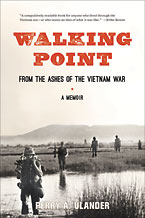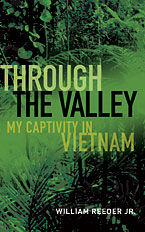 |
||||||||||||
|
Books in Review, May/June 2016 Walking Point: A Brilliant New Vietnam War Memoir REVIEWS BY MARC LEEPSON
A retired journeyman carpenter, Ulander dropped out of college in 1968 after studying structural engineering to get some on-the-job experience. That didn’t quite work out: He was drafted into the Army. During Basic Training at Fort Polk a rumor went around that going Airborne would get you sent to Germany, so Ulander volunteered for jump school and got his wings. “I was officially authorized,” he writes, “to be the only thing besides bird shit that comes out of the sky.” Then came Infantry AIT back at Fort Polk. When he finished, Ulander learned that the Germany rumor wasn’t true. He received orders for the war zone and arrived at Cam Ranh Bay in December of 1969. Then came a plane ride to LZ Uplift and his assignment to a line unit in the 173rd. None of his training prepared the new guy for what he saw when he laid eyes on the men in his company. They were “the motliest bunch of guys I’d yet seen in uniform,” he writes. “Some had their helmets on backward, and most had peace signs or FTA drawn on them—or both. They wore sunglasses and bandanas. One guy had sunglasses with purple lenses, and a few had pierced ears with gold peace-sign earrings.” The heart of the book is Ulander’s dense, in-the-trenches look at his nerve-wracking one-year tour of duty. In that respect, Walking Point adheres to the standard war memoir narrative: a chronological personal recounting, beginning with Basic Training, focusing on what happened in the war, and ending with coming home. But to his immense credit, Perry Ulander makes that format seem new and original at virtually every step—especially his evocations of how he learned to survive the many months he spent in harm’s way slogging through the jungle. The main themes are how Ulander conquered the physical and emotional burdens of fighting in the war and how he and his fellow grunts relied on smoking marijuana to cope. Another major theme is the bitter disconnect between the young draftee troops and their ticket-punching, by-the-book, lifer sergeants and officers who often endangered the men’s lives unnecessarily and callously. Ulander spells out in engaging and insightful prose what countless fellow Vietnam War veterans felt as they took part in America’s most controversial overseas war. “All the gung ho bullshit from training in the States—‘I wanna kill ol’ Charlie Cong’—was thoroughly lost in the translation from someone’s patriotic and militaristic ideal to reality,” Ulander writes early on. “Only the lifers, whose careers and pensions required a somewhat convincing performance, were into the war. For the rest of us, it was a long year of hoping and praying for a trip home with our bodies intact.” That theme of self-serving lifers at odds with the grunts is a central part of this beautifully written, introspective first book. Here’s Ulander’s description of what went on in the field: “None of us here believe in this fuckin’ war. We’re here till we go home—that’s it. Most guys think that if they’re out there risking their lives, they deserve to get high whenever they want, and I think they’re right.” Another refreshingly different aspect of this memoir is Ulander’s evocative recreation of what he experienced coming home from the war. In many Vietnam War memoirs we get depictions of the returning veteran being called a baby killer (and worse) by hippie antiwar demonstrators at an airport. In this memoir, Ulander offers an alternative take on the discombobulation we all felt when we returned to The World. He calls his first few hours home as surviving “the most well-planned ambush I had ever been in.” The ambush didn’t come in the form of bad vibes from civilians. Instead, it was the physical atmosphere and the mundane comings and goings of passengers at O’Hare Airport in Chicago that blindsided the returning grunt. The “first thing that came to my attention in the concourse was the air,” he writes. “I hadn’t realized how accustomed I’d become to the rich, earthy smells of rotting wood and decaying trees until the first whiff of the stagnant, lifeless, and metallic O’Hare assaulted my senses.” He “felt buffeted by turbulence of another sort. Feelings of anxiety, anger, and thinly masked sadness permeated the atmosphere. I knew these emotions were coming from the people around me.” When Ulander sat down for a drink at an airport bar, three businessmen spotted him. What came next was something you rarely hear about: A welcome home in the form of a proffered shot of whiskey. “They sat there, for all the world, smiling an acknowledgement to a tanned man just back from Vietnam,” Ulander writes. But, again, what came next is a surprise, as Ulander did not feel at all welcomed. “Jungle senses went on overload,” he writes, “telling me to get out of the kill zone.” After fleeing the bar, Ulander glanced at a newspaper and saw the headline: “Only Five Killed in Vietnam This Week.” That completed the homecoming emotional trifecta. “In less than an hour,” he writes, “I had been snagged by the wait-a-minute vine of weird emotions on the concourse, ambushed in the bar, and now stood blackened and charred by the booby-trapped newspaper. “My jungle senses were keener than ever as I made my way through the crowd. While on patrol, I could feel the emotions of the NVA, here I could sense the thoughts of people. A glance into someone’s eyes, and I could tell their intent beyond their conscious thinking. Sharp glances said, ‘Hold your tongue! We don’t want to hear it.’ ” Filled with stunning writing and an intriguing story, Walking Point should take its place among the best work in the American Vietnam War literary canon.
Nearly paralyzed and without a weapon, Reeder survived for three days in the jungle before being captured. Then he somehow made it through several weeks penned up in a jungle prison camp in South Vietnam, an excruciating forced march to Hanoi, and imprisonment in the infamous Hanoi Hilton. Reeder, who went on to make the Army a career, is one of those who believed in the Vietnam War mission. Even late in the war and “despite the protests at home,” he writes, “I felt proud of what we were doing. I believed in preserving the South against communist aggression from the North.” Reeder tells a harrowing yet ultimately uplifting story of survival against strong odds. With the exception of some reconstructed dialogue, the tale rings true. Even though we know Reeder will survive, this account still keeps the reader engaged until the end.
|
||||||||||||
|
|
||||||||||||
|
|
||||||||||||
8719 Colesville Road, Suite 100, Silver Spring. MD 20910 | www.vva.org | contact us |
||||||||||||






















